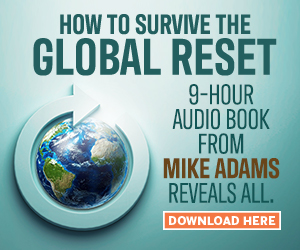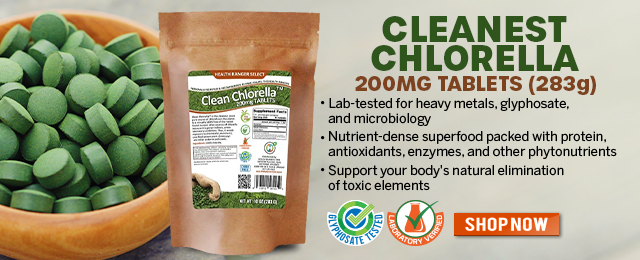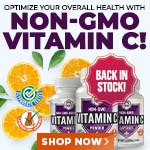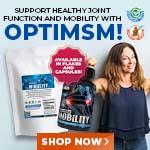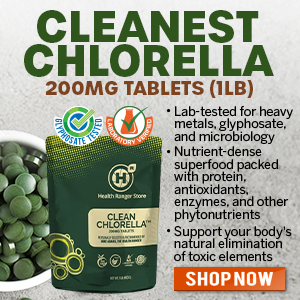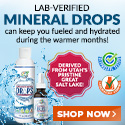
Naturopathic physicians treat the whole patient, not just the symptoms of disease: an interview with Dr. Joseph Pizzorno
 Tuesday, February 08, 2005 Tuesday, February 08, 2005by Mike Adams, the Health Ranger Editor of NaturalNews.com (See all articles...) Tags: naturopathy, naturopathic physicians, NDs |
- Solar storm sparks concern as supervolcano nears eruption: Could sun's electromagnetic pulse trigger cataclysm?
- Mysterious hexagonal UFO sighting over California sparks questions amid government secrecy
- “Cancer-Free with Food”: A culinary revolution in the fight against disease
- Pfizer’s election meddling exposed: Top scientists weaponized science to sway the 2020 vote, so they could benefit from unlawful mandates
- Gum bacteria invade heart, trigger dangerous heart rhythm problems
- The hidden dangers of oversleeping: How too much rest harms cognition, fuels depression, and shortens life
- The water cure: Unveiling the hidden link between dehydration, obesity, cancer and depression
- Trump’s Gulf tour sparks Iran nuclear deal breakthrough amid regional shifts
- Zero-waste bean cooking: Repurposing pinto bean broth in soups or bread
- WHO's PANDEMIC AGREEMENT just a ploy to CONTROL every aspect of any SCAMDEMIC they declare at any time and indefinitely
- RFK Jr. announces simplified federal dietary guidelines promoting whole foods, slams past industry influence
- Unlocking the power of polyphenols: A new frontier in disease prevention and treatment
- Forever chemicals” invade Australian water supply: Investigation yields torrent of carcinogens, signifying vast regulatory failure
- James Comey's posts cryptic ’86 47′ message and gaslights the public after being confronted with passive aggressive death threat to President Trump
- Saw Palmetto: The mighty berry for men's health and beyond
- EXPENSIVE CANCER THERAPY promoted in New Zealand while ignoring the very CAUSE of their shockingly high rate of lymphoma cases
- CDC's dangerous gamble: Pregnant women and their unborn babies at put at unreasonable RISK from SIX toxic vaccines
- New Jersey Transit engineers strike halts rail service, stranding 350,000 commuters
- WAR ON COGNITION: The Coordinated Assault on Your Brain and How to Defend Yourself Against Every Attack
- Canada's COVID cover-up: Health officials swore secrecy to protect Trudeau from vaccine scandal
- Singapore's draconian vaccine mandate: Citizens face jail time for refusing FORCED medical procedures that do HARM
- Big Pharma's Dirty Secret: How Prescription Drugs Are Starving Your Body of Essential Nutrients
- Gene-edited pork sneaks onto your plate: FDA quietly approves CRISPR pigs amid health and ethical concerns
- RED ALERT: Nuclear War Between India and Pakistan Could Trigger Global Catastrophe… full RISK ANALYSIS
- JESUS NEVER SPOKE ENGLISH: Historical facts on why the Bible you’re probably reading has been altered, redacted or hidden from much of its original meaning
- Hidden poison in your medicine and supplements: How phthalates in capsules are silently attacking your heart, thyroid, and hormones
- BBC accused of “political censorship” for shelving Gaza documentary amid mounting pressure
- Brushing with poison: Study finds toxic heavy metals in 90% of toothpaste brands, including those for children
- Australia’s vaccine cover-up: 35 died same day as COVID shot, but authorities ignored them
- Why All Government Officials and Big Tech CEOs Who Engage in Systematic Viewpoint Censorship Must Be ARRESTED, Prosecuted, and Sentenced to Life in Prison
- Silent catastrophe: COVID-19 vaccines linked to plummeting fertility rates, Czech data reveals
- Survival basics: 5 Dangerous locations to avoid during an EMP attack
- X-class solar flare sparks worldwide disruptions, with more storms expected as sunspot turns toward Earth
- The truth about Benzyl Alcohol in beauty products
- DOJ targets controversial “Proximal Origin” study in push for scientific transparency
- Landmark study of 85 million reveals shocking surge in heart attacks, strokes, and sudden death following the notorious COVID-19 jab
- The Miraculous Healing Power of DMSO: Nature's Forgotten Cure for Cancer, Pain, and Regeneration
- Biblical truth: God will carry out a “cosmic reset” of Earth and destroy all human civilization with a series of extinction-level cosmic impacts known as The Seven Trumpets, Seven Bowls and Seven Seals
- URGENT REPORT: The China Import Embargo - What to Stockpile Now Before America Runs Out
- The Ultimate Survival Guide to Baking Soda: A Miraculous, Multi-Purpose Remedy for Health, Home, and Emergency Preparedness
- A call to preserve America’s future: “Defeating Big Government Socialism” by Newt Gingrich
- Stunning Visualization of the Seven Trumpets in the Book of Revelation
- Big Pharma launches “Vaccine Integrity Project” to combat Secretary Kennedy and keep 94 shots going into kids with mandates and liability protections
- World Economic Forum's current downfall exposes legacy of totalitarianism, financial fraud, and crimes against humanity
- Widespread social and economic unrest: Steve Quayle issues urgent financial warning of imminent asset collapse in new interview with Mike Adams
- Aerosolized bioweapons? Strange “diploid biomasses” falling out of the sky in Florida captured under the microscope
- Biden regime deployed over 600 grants to fund disinformation agenda, to silence the truth and stifle debate
- The Miraculous Healing Power of Green Tea: Unlocking the Potent Antioxidants That Big Pharma Doesn't Want You to Know About
- The unspoken truth about chemotherapy: These “treatments” create toxic time bombs in your body called CELL-KILLING PARTICLES
- U.S. Government's Bio-War Against America: 15 Historical Medical Horrors Inflicted on the American People by the Government Itself
- A win for free speech: State Department SHUTS DOWN controversial disinformation office
- French rioting demonstrates how gun control laws are failing law-abiding citizens
- Head of L.A. Port warns of incoming plunge in U.S. supply chain, empty shelves and inventory depletion in 5-7 weeks
- Supreme Court to review challenge to Illinois’ semi-automatic gun ban
- Red Cross issues warning to stop blood plasma donations from vaccinated people
- Scientists confirm: GENIUS brain function can be spontaneously unleashed in humans without any apparent cause
- EPA advisor admits the agency is funneling billions to climate groups ahead of Trump’s return to White House
- HYSSOP: What research reveals about the health benefits of this ancient holy herb
- Two containers with completed ballots fall out of truck in Florida
- Newly released JFK files reveal Pentagon's role in creating Lyme disease and covid in the same lab
- Mike Adams releases country western hit single: Goin’ Back in Time is Comin’ Home
- Global leaders unite to clamp down on “misinformation” with UN-backed Cascais Declaration
- BREAKING: 2025 NDAA authorizes mandatory military draft of WOMEN across America… as Pentagon pursues global NUCLEAR war with both Russia and China at the same time
- I Want My Bailout Money – new song released by Mike Adams
- Michael Yon warns of a ZIONIST TAKEOVER in Trump’s second administration
- Ozempic and Wegovy weight loss drugs are injectable LIZARD VENOM PEPTIDES that may unleash a devastating wave of organ failure… side effects align with symptoms of SNAKE BITES
- BOMBSHELL: DNA testing kits are a SCAM to develop ethnic-specific bioweapons
- The Health Ranger releases “Vaccine Zombie” song and music video, using AI-animated zombies for the music video
- These 13 countries just signed an agreement to engineer a global FAMINE by destroying food supply
- Israeli soldiers accused of even more torture and abuse in the West Bank
- RFK Jr. clears key hurdle: Sen. Susan Collins backs controversial HHS nominee, signaling a new era for health policy
- Sermon 30: How Jesus reveals Caesar’s FAKE CURRENCY and FALSE AUTHORITY
Mike: Does this philosophy of naturopathy stand at odds with much of what's going on in the pharmaceutical industry today, which is "sell more drugs no matter what"?
Dr. Pizzorno: Very much so. You mentioned the gold standard in the pharmaceutical industry, and this is from their own literature; to find drugs people will be on for the rest of their lives. A lot of the research going on right now is to find these designer drugs. Sometimes that's appropriate, but most of the time, that's not what's best for the patient. If I have someone with migraines, is it better to give them an expensive drug, like Sumtriptan, which has significant side effects, or is it better to say, "Your diet is deficient in magnesium -- consume foods richer in magnesium." Now, only 1 out of 6 patients with migraines need magnesium. But for that 1 out of 6, increased magnesium in the diet is almost miraculous in what it does for them, because not only does it relieve the migraines, but everything else impacted by inadequate magnesium will improve as well.
Mike: What about a case like high LDL cholesterol? Of course, the statin drugs are the conventional approach -- what would your approach entail?
Dr. Pizzorno: Well, there are a lot of possibilities. One is, if you have a patient, for example, who just wants to use drugs, doesn't want to change their diet -- well, fine, use the statin drugs, because they are pretty effective. But also realize that the statin drugs have some significant side effects, and a lot of those side effects are due to the fact that statin drugs poison the enzymes of the mitochondria that produce coenzyme Q10. So if a person takes statin drugs, I would give that person an additional amount of coenzyme Q10 to help relieve the side effects of the prescription drugs. So that's an idea of, you might say, integrated or co-managed care, where we say, okay, you're going to be on the drug, but let's use some natural medicine to relieve the side effects of the drug.
Now, alternatively, most people who have elevated cholesterol and triglycerides, it is due to dietary inappropriateness. And so we go to the person's diet and look at, now what are they doing inappropriately? What food are they eating that they shouldn't be eating, what foods should they be eating that they're not eating, what nutritional supplements can we give the person to help their system start producing more appropriate levels and appropriate types of cholesterol? In addition, if we have to, there are some natural herbal therapies that can be used to help decrease their cholesterol levels. I always try first to do it with diet and nutrition, and then use the herbs.
Mike: That's interesting. Do you find that patients are able to integrate the diet and nutritional advice?
Dr. Pizzorno: Well, not everybody's willing to do that, but I admit, I see a skewed population. And that is, if people come to see me, and come to see naturopathic doctors, in general they know what to expect -- they know they're not just going to get a pill. They know they're going to have to change their lives, so people who come to see us seem to be more willing to make the changes. And they're often pretty frustrated with what their experience has been with conventional medicine, so they're willing to make changes.
Mike: Moving on to some of the contrasts between conventional medicine and naturopathic medicine, in conventional medicine a set of symptoms is frequently labeled a disease -- high cholesterol is a disease or pain is a disease, or a brain chemistry imbalance is called a disease. It seems to me, from your explanations here, that naturopaths will always go at least one step further and say, what is the cause of this symptom? Does that mean that they have different names for diseases, or a different philosophy in naming them?
Dr. Pizzorno: Well, that actually is asking a fantastic question, and it gets into an issue that I address in an editorial I wrote for Integrated Medicine, a clinician's journal. This is a journal that I'm the editor of, and about a year ago I wrote an editorial which was a bit controversial, and I said on the editorial, is disease real? And I was trying to be provocative for a reason -- if you look at conventional medicine, conventional medicine has now come up with about 7,000 disease labels, and while this has worked well for medicine -- I think one of the reasons conventional medicine has advanced as well as it has is because they came up with these standardized diagnoses, came up with standardized diseases, and then standardized therapies for those diseases.
The problem is, it assumes that everybody's the same, and they're not. We're all biochemically unique. So, I look at disease, and let's take juvenile diabetes as an example, or NIDD1. Now, juvenile onset diabetes actually describes what's going on in the patient physiologically. Basically NIDD1 means that their pancreatic cells are gone; they don't produce insulin. So there you have a good correlation between what's going on with the patient physiologically and the disease name they have. But if you look at NIDD2, or adult onset diabetes, there you have a situation where you have elevated blood sugar, and we call it diabetes. However, people get the elevated blood sugar due to a wide range of problems -- it could be that they're not producing enough insulin, or it could be that the insulin they're producing is malformed, or it could be that the insulin receptor sites on the cell walls that attach to insulin aren't working properly, or it could be the cells signaling within the cell when the cell's supposed to absorb sugar isn't absorbing sugar properly. And there are some other reasons too, but each one of those reasons is physiologically different.
Now, if you take a conventional approach, you say, oh, elevated blood sugar -- let's give that person insulin. Well, yes, the blood sugar will go down, but the underlying pathology, the underlying physiological dysfunction which results in elevated blood sugar has not been addressed. So from my perspective, the term "diabetes" actually obfuscates what's going on with the patient physiologically.
So, while I won't put a disease label on someone with insulin insensitivity on a cellular level, what I do is I try to reverse that insulin insensitivity so that the cells respond to insulin the way they're supposed to. Now it turns out that this is a very common cause of adult onset diabetes, and one of the primary reasons is because the standard American diet is very low in a trace mineral called chromium. Without chromium, the insulin receptor sites won't work properly. So what I do with these people is, not only do I put them on a diet that has lower amounts of refined sugar but I also get more chromium in the diet, either supplementary or through food, and by re-establishing normal function, the blood sugar goes down, and it goes down not because I gave them a drug; it goes down because I got the body working better.
Mike: Kudos to you, also for avoiding a quick label for individual patients, because isn't it true that many patients, once they are given a label, they adopt that as part of who they are? They say "I am diabetic,” and then even that can change their response down the road, can't it?
Dr. Pizzorno: Oh, absolutely, and I think it's very tragic when somebody adopts the disease label as kind of a point of identification. I think that's very unfortunate, because not only does it have identification, but it also starts saying, “Well, I'm limited because of this.” And you see this in patients -- they start restricting their life based on this diagnosis. Why be limited to something like that? It doesn't make sense, but that does happen to people.
Mike: There's also a widespread belief that once you've been given a label of a disease, it seems like there's less you can do to reverse it at that point.
Dr. Pizzorno: Yes. And I think it's true that once a pathology is well-advanced, there's been so much damage, there's a limit to how far you can reverse things. But for the vast majority of people in our society, and particularly those early in the degenerative disease process, that's reversible, and one of my greatest critiques of conventional medicine is basically saying to people, “Well, either you're ’normal‘ or you've got disease that is bad enough that it now warrants a drug.” Well, between normal and a disease bad enough it warrants a drug, there's a lot of physiological dysfunction going on that's easily reversible at that point. But the longer you use the drug, the longer the disease progresses, the more difficult it is for the body to re-establish normal health.
You've been reading part two of a five-part interview with Dr. Joseph Pizzorno, the founding president of Bastyr University. Dr. Pizzorno was appointed by President Clinton in December 2000 to the White House Commission on Complementary and Alternative Medicine Policy. President Bush’s administration appointed him to the Medicare Coverage Advisory Committee in February 2003. He is also the co-author of the “Textbook of Natural Medicine” and the “Handbook of Natural Medicine.”
Naturopathy at FETCH.news
Get independent news alerts on natural cures, food lab tests, cannabis medicine, science, robotics, drones, privacy and more.
 About the author:Mike Adams (aka the "Health Ranger") is a best selling author (#1 best selling science book on Amazon.com) and a globally recognized scientific researcher in clean foods. He serves as the founding editor of NaturalNews.com and the lab science director of an internationally accredited (ISO 17025) analytical laboratory known as CWC Labs. There, he was awarded a Certificate of Excellence for achieving extremely high accuracy in the analysis of toxic elements in unknown water samples using ICP-MS instrumentation. Adams is also highly proficient in running liquid chromatography, ion chromatography and mass spectrometry time-of-flight analytical instrumentation.
About the author:Mike Adams (aka the "Health Ranger") is a best selling author (#1 best selling science book on Amazon.com) and a globally recognized scientific researcher in clean foods. He serves as the founding editor of NaturalNews.com and the lab science director of an internationally accredited (ISO 17025) analytical laboratory known as CWC Labs. There, he was awarded a Certificate of Excellence for achieving extremely high accuracy in the analysis of toxic elements in unknown water samples using ICP-MS instrumentation. Adams is also highly proficient in running liquid chromatography, ion chromatography and mass spectrometry time-of-flight analytical instrumentation.
Adams is a person of color whose ancestors include Africans and Native American Indians. He's also of Native American heritage, which he credits as inspiring his "Health Ranger" passion for protecting life and nature against the destruction caused by chemicals, heavy metals and other forms of pollution.
Adams is the founder and publisher of the open source science journal Natural Science Journal, the author of numerous peer-reviewed science papers published by the journal, and the author of the world's first book that published ICP-MS heavy metals analysis results for foods, dietary supplements, pet food, spices and fast food. The book is entitled Food Forensics and is published by BenBella Books.
In his laboratory research, Adams has made numerous food safety breakthroughs such as revealing rice protein products imported from Asia to be contaminated with toxic heavy metals like lead, cadmium and tungsten. Adams was the first food science researcher to document high levels of tungsten in superfoods. He also discovered over 11 ppm lead in imported mangosteen powder, and led an industry-wide voluntary agreement to limit heavy metals in rice protein products.
In addition to his lab work, Adams is also the (non-paid) executive director of the non-profit Consumer Wellness Center (CWC), an organization that redirects 100% of its donations receipts to grant programs that teach children and women how to grow their own food or vastly improve their nutrition. Through the non-profit CWC, Adams also launched Nutrition Rescue, a program that donates essential vitamins to people in need. Click here to see some of the CWC success stories.
With a background in science and software technology, Adams is the original founder of the email newsletter technology company known as Arial Software. Using his technical experience combined with his love for natural health, Adams developed and deployed the content management system currently driving NaturalNews.com. He also engineered the high-level statistical algorithms that power SCIENCE.naturalnews.com, a massive research resource featuring over 10 million scientific studies.
Adams is well known for his incredibly popular consumer activism video blowing the lid on fake blueberries used throughout the food supply. He has also exposed "strange fibers" found in Chicken McNuggets, fake academic credentials of so-called health "gurus," dangerous "detox" products imported as battery acid and sold for oral consumption, fake acai berry scams, the California raw milk raids, the vaccine research fraud revealed by industry whistleblowers and many other topics.
Adams has also helped defend the rights of home gardeners and protect the medical freedom rights of parents. Adams is widely recognized to have made a remarkable global impact on issues like GMOs, vaccines, nutrition therapies, human consciousness.
In addition to his activism, Adams is an accomplished musician who has released over a dozen popular songs covering a variety of activism topics.
Click here to read a more detailed bio on Mike Adams, the Health Ranger, at HealthRanger.com.
Take Action: Support Natural News by linking to this article from your website
Permalink to this article:
Embed article link: (copy HTML code below):
Reprinting this article:
Non-commercial use OK, cite NaturalNews.com with clickable link.
Follow Natural News on Facebook, Twitter, Google Plus, and Pinterest
Science News & Studies
Medicine News and Information
Food News & Studies
Health News & Studies
Herbs News & Information
Pollution News & Studies
Cancer News & Studies
Climate News & Studies
Survival News & Information
Gear News & Information
News covering technology, stocks, hackers, and more



"Big Tech and mainstream media are constantly trying to silence the independent voices that dare to bring you the truth about toxic food ingredients, dangerous medications and the failed, fraudulent science of the profit-driven medical establishment.
Email is one of the best ways to make sure you stay informed, without the censorship of the tech giants (Google, Apple, Facebook, Twitter, YouTube, etc.). Stay informed and you'll even likely learn information that may help save your own life."
–The Health Ranger, Mike Adams











